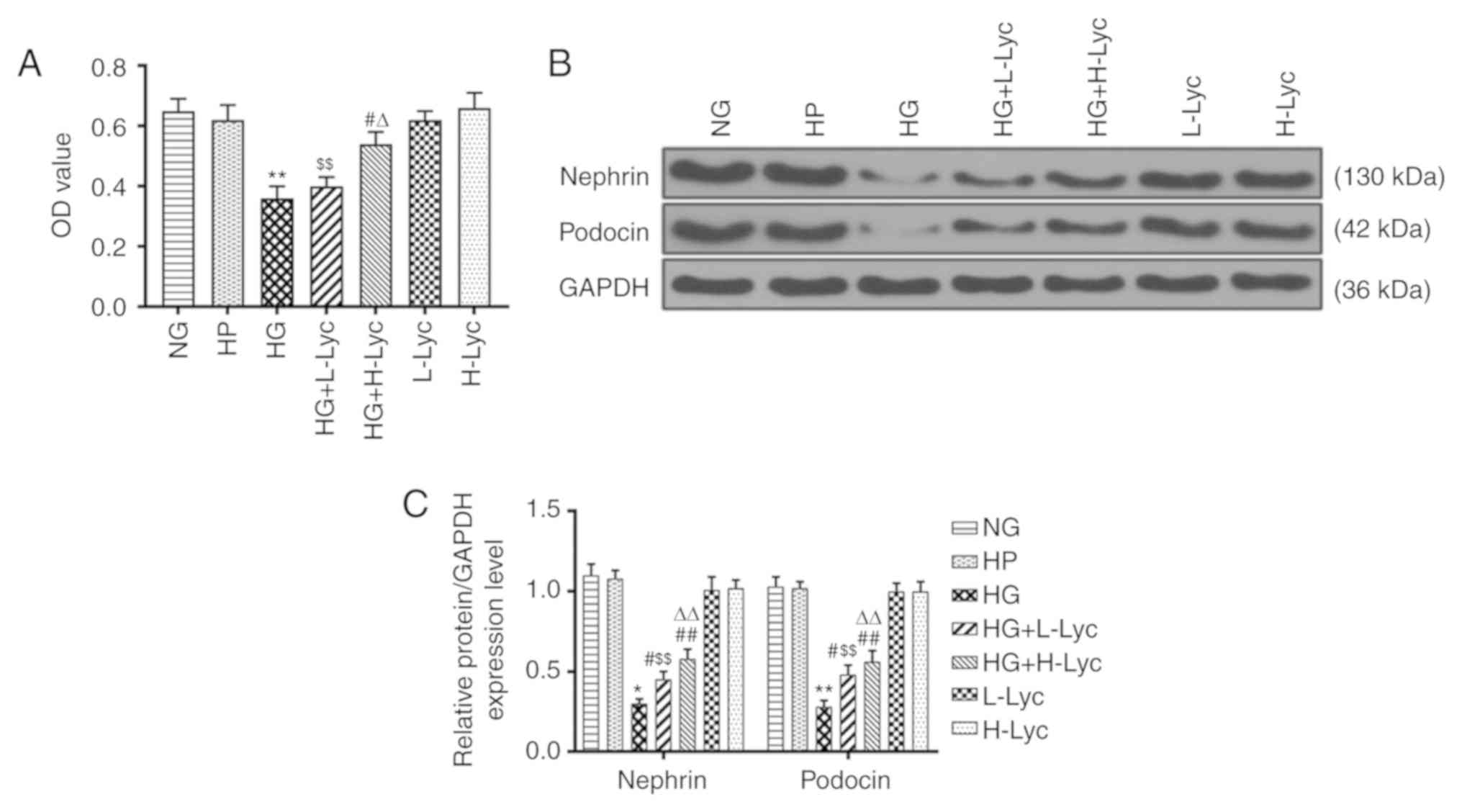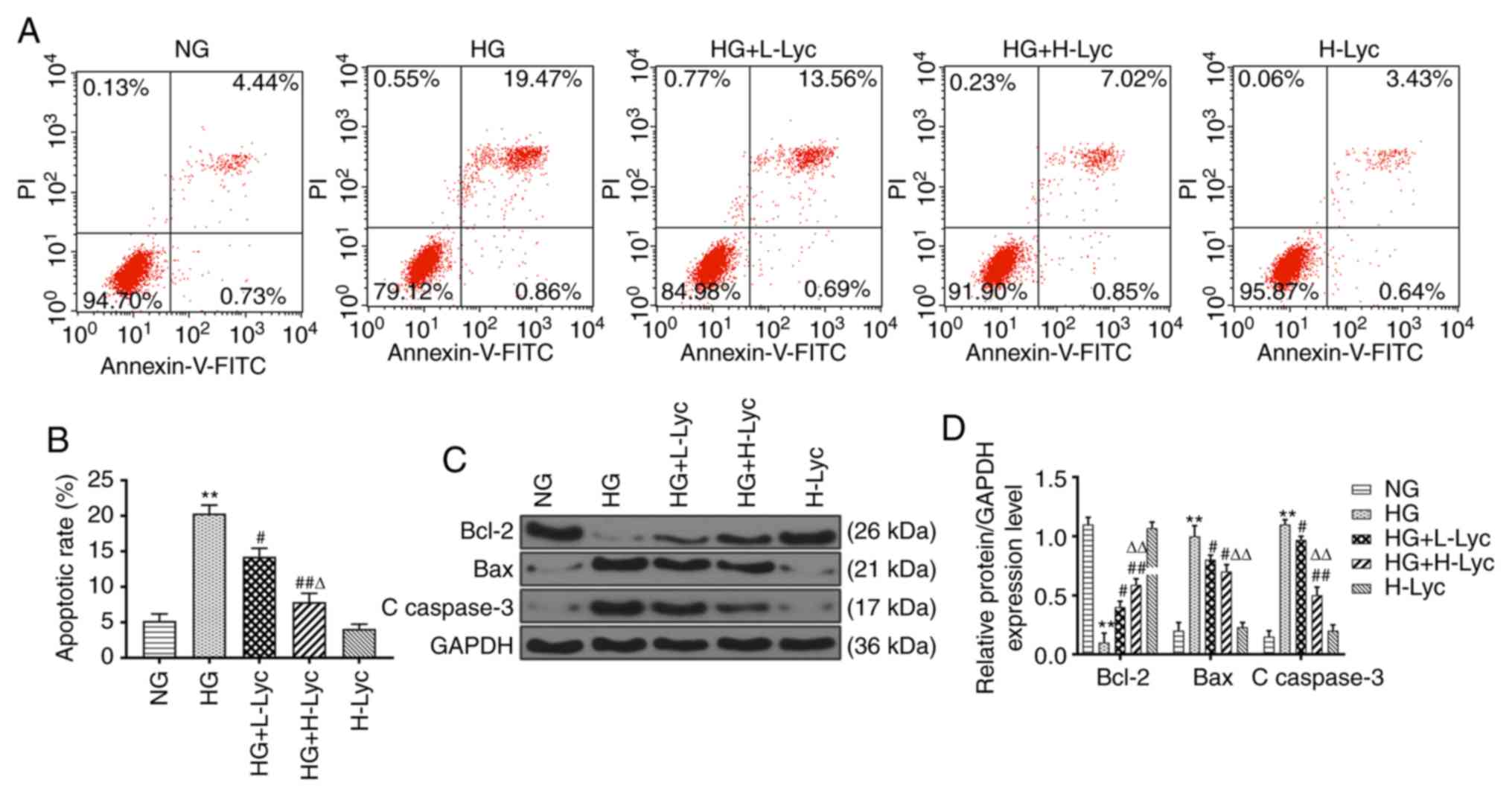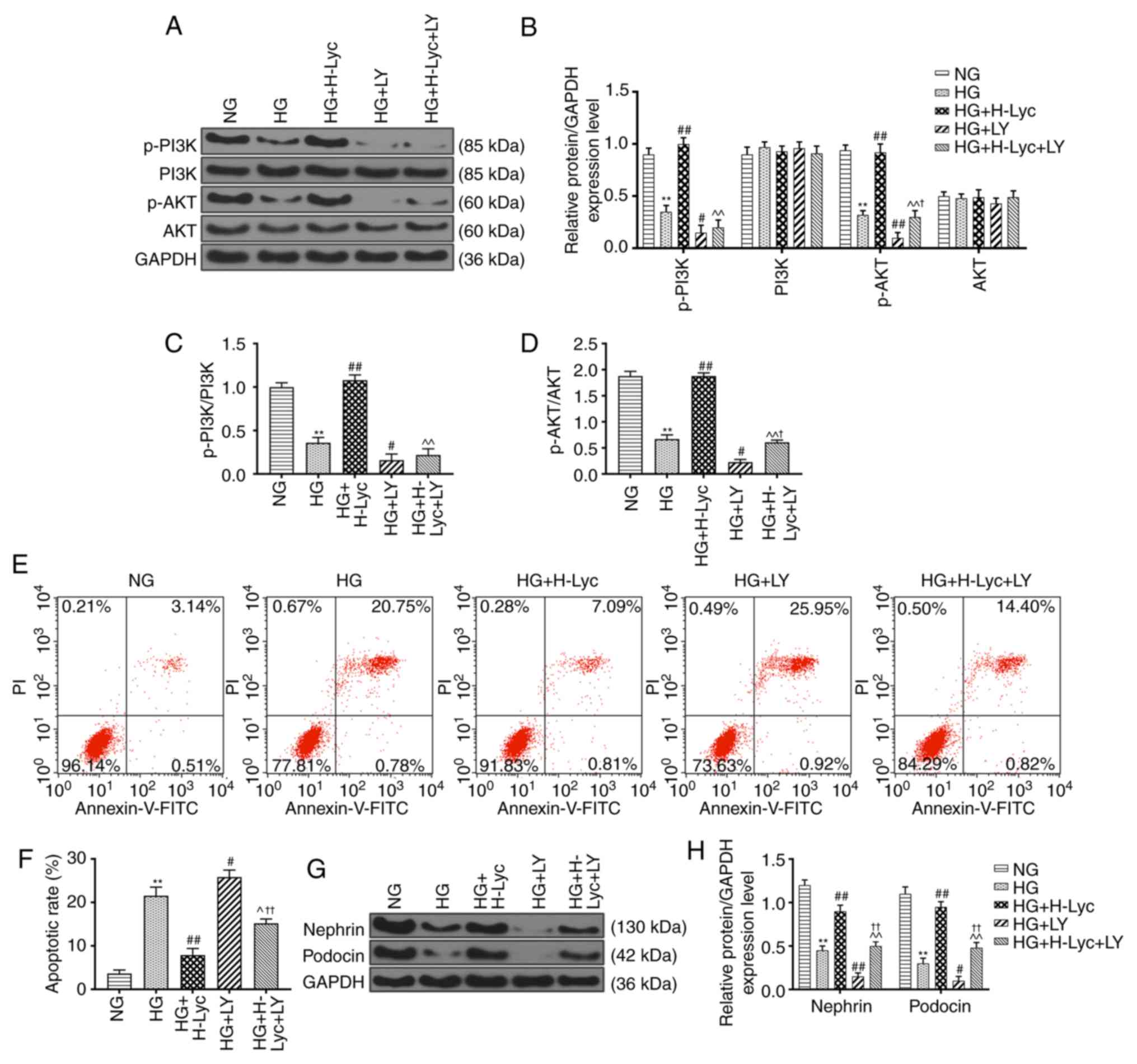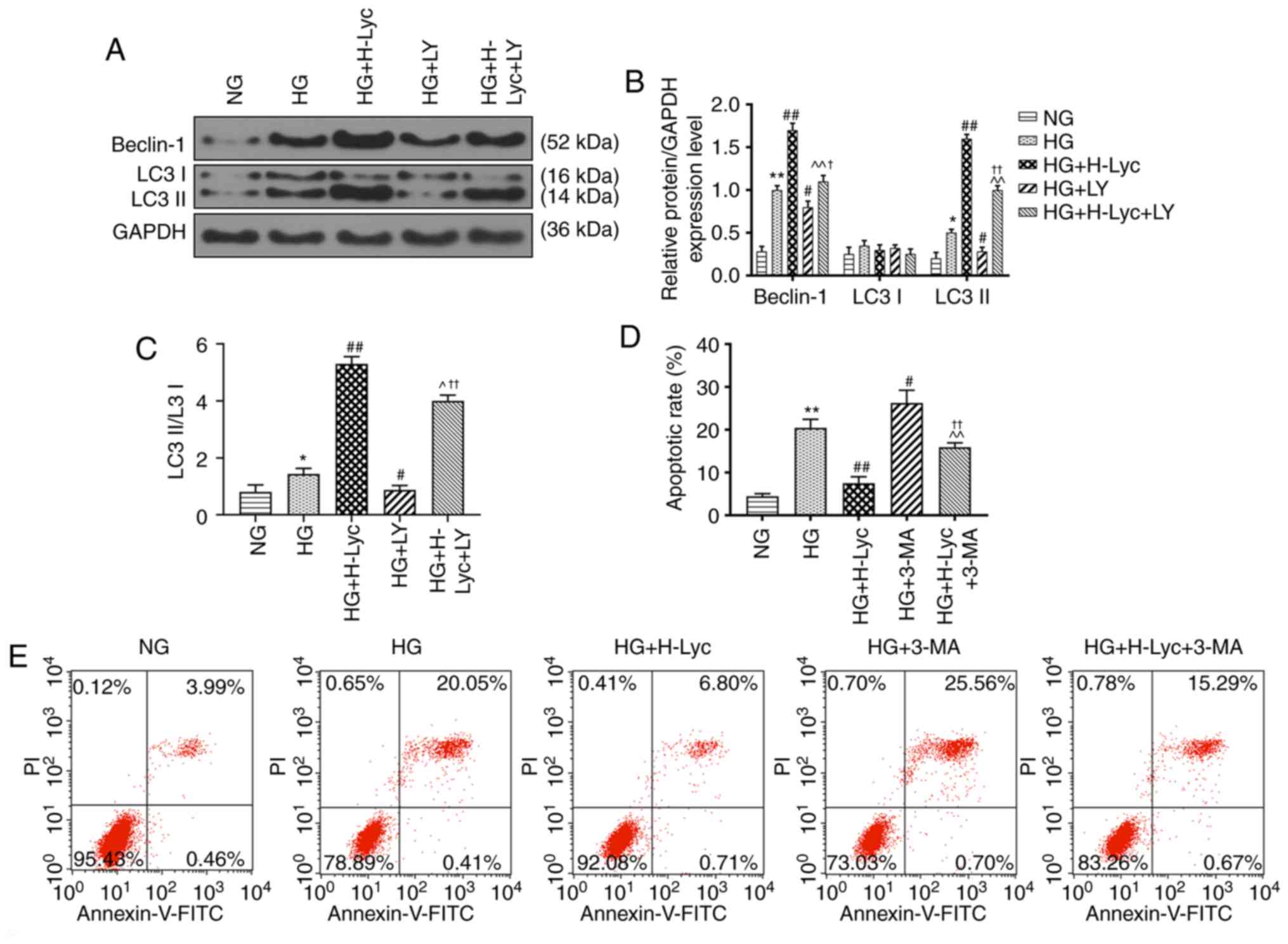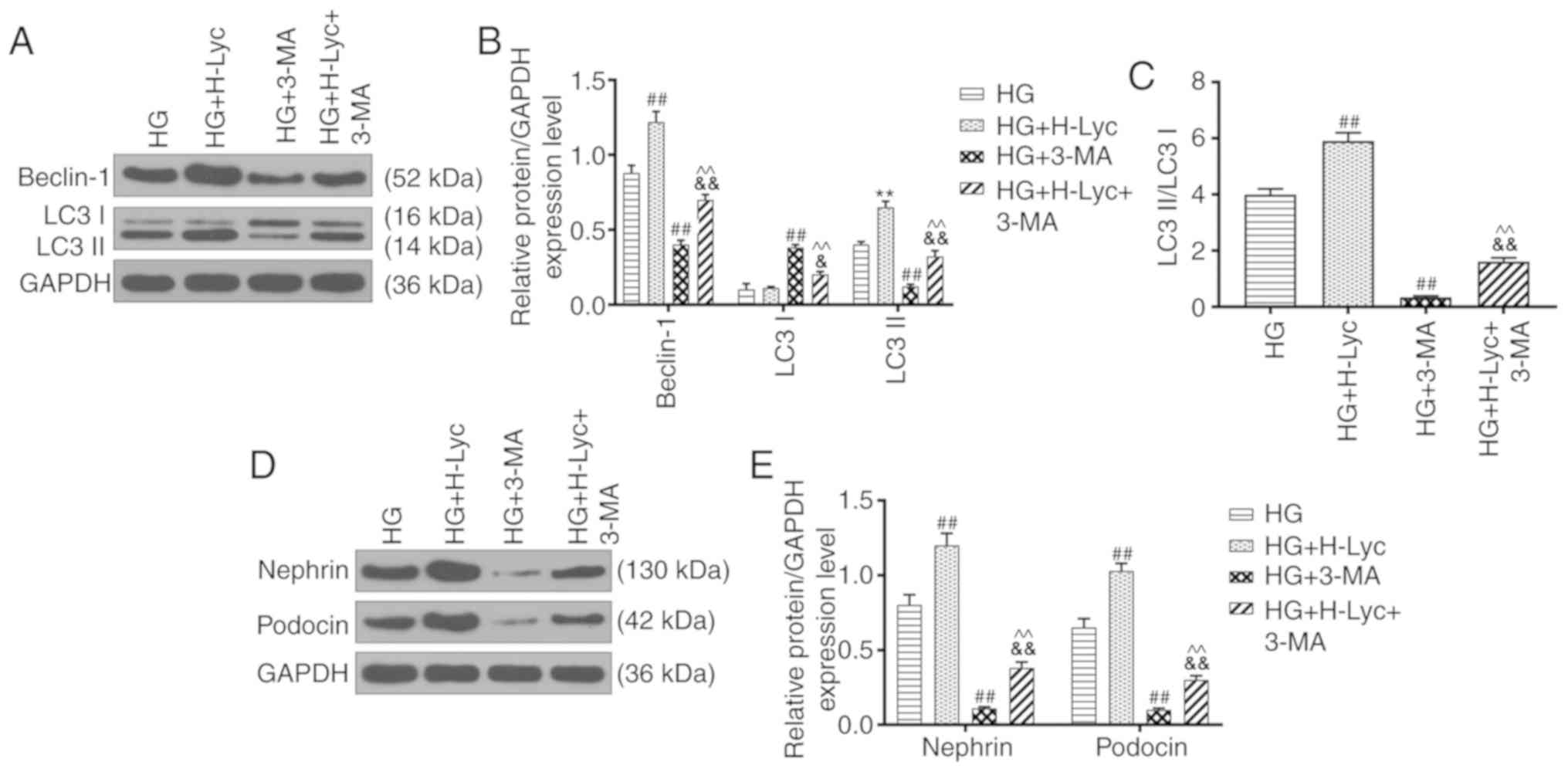|
1
|
Jin Y, Liu S, Ma Q, Xiao D and Chen L:
Berberine enhances the AMPK activation and autophagy and mitigates
high glucose-induced apoptosis of mouse podocytes. Eur J Pharmacol.
794:106–114. 2017.PubMed/NCBI View Article : Google Scholar
|
|
2
|
Hazman Ö and Bozkurt MF: Anti-inflammatory
and antioxidative activities of safranal in the reduction of renal
dysfunction and damage that occur in diabetic nephropathy.
Inflammation. 38:1537–1545. 2015.PubMed/NCBI View Article : Google Scholar
|
|
3
|
Aso Y: Cardiovascular disease in patients
with diabetic nephropathy. Curr Mol Med. 8:533–543. 2008.PubMed/NCBI View Article : Google Scholar
|
|
4
|
Lee JH, Kim D, Oh YS and Jun HS:
Lysophosphatidic acid signaling in diabetic nephropathy. Int J Mol
Sci. 20(2850)2019.PubMed/NCBI View Article : Google Scholar
|
|
5
|
Vervoort G: Treatment Goals in Diabetic
Nephropathy. Pathophysiology and Clinical. Aspects. In: Diabetic
Nephropathy. Roelofs J and Vogt L (eds). Springer, Cham, pp435-450,
2019.
|
|
6
|
Najafian B, Alpers CE and Fogo AB:
Pathology of human diabetic nephropathy. Contrib Nephrol.
170:36–47. 2011.PubMed/NCBI View Article : Google Scholar
|
|
7
|
Ziyadeh FN, Hoffman BB, Han DC,
Iglesias-De La, Cruz MC, Hong SW, Isono M, Chen S, McGowan TA and
Sharma K: Long-term prevention of renal insufficiency, excess
matrix gene expression, and glomerular mesangial matrix expansion
by treatment with monoclonal antitransforming growth factor-beta
antibody in db/db diabetic mice. Proc Natl Acad Sci USA.
97:8015–8020. 2000.PubMed/NCBI View Article : Google Scholar
|
|
8
|
Yu SM and Bonventre JV: Acute kidney
injury and progression of diabetic kidney disease. Adv Chronic
Kidney Dis. 25:166–180. 2018.PubMed/NCBI View Article : Google Scholar
|
|
9
|
Tharaux PL and Huber TB: How is
proteinuric diabetic nephropathy caused by disturbed proteostasis
and autophagy in podocytes? Diabetes. 65:539–541. 2016.PubMed/NCBI View Article : Google Scholar
|
|
10
|
Marusugi K, Nakano K, Sasaki H, Kimura J,
Yanobu-Takanashi R, Okamura T and Sasaki N: Functional validation
of tensin2 SH2-PTB domain by CRISPR/Cas9-mediated genome editing. J
Vet Med Sci. 78:1413–1420. 2016.PubMed/NCBI View Article : Google Scholar
|
|
11
|
Huang G, Zou B, Lv J, Li T, Huai G, Xiang
S, Lu S, Luo H, Zhang Y, Jin Y and Wang Y: Notoginsenoside R1
attenuates glucose-induced podocyte injury via the inhibition of
apoptosis and the activation of autophagy through the PI3K/Akt/mTOR
signaling pathway. Int J Mol Med. 39:559–568. 2017.PubMed/NCBI View Article : Google Scholar
|
|
12
|
Barisoni L, Schnaper HW and Kopp JB:
Advances in the biology and genetics of the podocytopathies:
Implications for diagnosis and therapy. Arch Pathol Lab Med.
133:201–216. 2009.PubMed/NCBI View Article : Google Scholar
|
|
13
|
Shankland SJ: The podocyte's response to
injury: Role in proteinuria and glomerulosclerosis. Kidney Int.
69:2131–2147. 2006.PubMed/NCBI View Article : Google Scholar
|
|
14
|
Agarwal S and Rao AV: Tomato lycopene and
its role in human health and chronic diseases. CMAJ. 163:739–744.
2000.PubMed/NCBI
|
|
15
|
Fan S, Sun JB, Li R, Song X and Li J:
Lycopene protects myocardial ischemia injury through anti-apoptosis
and anti-oxidative stress. Eur Rev Med Pharmacol Sci. 23:3096–3104.
2019.PubMed/NCBI View Article : Google Scholar
|
|
16
|
Sahin K, Orhan C, Sahin N and Kucuk O:
Anticancer Properties of Lycopene. Springer, Cham, 2019.
|
|
17
|
Kawata A, Murakami Y, Suzuki S and
Fujisawa S: Anti-inflammatory activity of β-Carotene, Lycopene and
Tri-n-butylborane, a scavenger of reactive oxygen species. In Vivo.
32:255–264. 2018.PubMed/NCBI View Article : Google Scholar
|
|
18
|
Li W, Wang G, Lu X, Jiang Y, Xu L and Zhao
X: Lycopene ameliorates renal function in rats with
streptozotocin-induced diabetes. Int J Clin Exp Pathol.
7:5008–5015. 2014.PubMed/NCBI
|
|
19
|
Ni L, Yang XL, Qiao H and Lin J: Effects
of lycopene on high glucose-induced autophagy and apoptosis of
podocytes. Clin Nephrol. 18:48–53. 2018.(In Chinese).
|
|
20
|
Liu WT, Peng FF, Li HY, Chen XW, Gong WQ,
Chen WJ, Chen YH, Li PL, Li ST, Xu ZZ and Long HB: Metadherin
facilitates podocyte apoptosis in diabetic nephropathy. Cell Death
Dis. 7(e2477)2016.PubMed/NCBI View Article : Google Scholar
|
|
21
|
Ni L, Qiao H, Lin J and Chang-xuan L:
Lycopene relieves the damage of mouse podocytes induced by high
glucose and its mechanism. Southeast Univ (Med Sci Edi).
37:229–234. 2018.(In Chinese).
|
|
22
|
Wang K: Autophagy and apoptosis in liver
injury. Cell Cycle. 14:1631–1642. 2015.PubMed/NCBI View Article : Google Scholar
|
|
23
|
Gao F, He X, Liang S, Liu S, Liu H, He Q,
Chen L, Jiang H and Zhang Y: Quercetin ameliorates podocyte injury
via inhibition of oxidative stress and the TGF-β1/Smad pathway in
DN rats. RSC Adv. 8:35413–35421. 2018.
|
|
24
|
Wei M, Li Z, Xiao L and Yang Z: Effects of
ROS-relative NF-KB signaling on high glucose-induced TLR4 and MCP-1
expression in podocyte injury. Mol Immunol. 68:261–271.
2015.PubMed/NCBI View Article : Google Scholar
|
|
25
|
Gong Q, He LL, Wang ML, Ouyang H, Gao HW,
Feng YL, Yang SL, Du LJ, Li J and Luo YY: Anemoside B4 protects rat
kidney from adenine-induced injury by attenuating inflammation and
fibrosis and enhancing podocin and nephrin expression. Evid Based
Complement Alternat Med. 2019(8031039)2019.PubMed/NCBI View Article : Google Scholar
|
|
26
|
Tesch GH: Review: Serum and urine
biomarkers of kidney disease: A pathophysiological perspective.
Nephrology (Carlton). 15:609–616. 2010.PubMed/NCBI View Article : Google Scholar
|
|
27
|
Szrejder M and Piwkowska A: AMPK
signalling: Implications for podocyte biology in diabetic
nephropathy. Biol Cell. 111:109–120. 2019.PubMed/NCBI View Article : Google Scholar
|
|
28
|
Reidy K, Kang HM, Hostetter T and Susztak
K: Molecular mechanisms of diabetic kidney disease. J Clin Invest.
124:2333–2340. 2014.PubMed/NCBI View
Article : Google Scholar
|
|
29
|
Li W, Wang Q, Du M, Ma X, Wu L, Guo F,
Zhao S, Huang F, Wang H and Qin G: Effects of overexpressing FoxO1
on apoptosis in glomeruli of diabetic mice and in podocytes
cultured in high glucose medium. Biochem Biophys Res Commun.
478:612–617. 2016.PubMed/NCBI View Article : Google Scholar
|
|
30
|
Saurus P, Kuusela S, Dumont V, Lehtonen E,
Fogarty CL, Lassenius MI, Forsblom C, Lehto M, Saleem MA, Groop PH
and Lehtonen S: Cyclin-dependent kinase 2 protects podocytes from
apoptosis. Sci Rep. 6(21664)2016.PubMed/NCBI View Article : Google Scholar
|
|
31
|
Nagata S: Apoptosis by death factor. Cell.
88:355–365. 1997.PubMed/NCBI View Article : Google Scholar
|
|
32
|
Fulda S: Therapeutic exploitation of
necroptosis for cancer therapy. Semin Cell Dev Biol. 35:51–56.
2014.PubMed/NCBI View Article : Google Scholar
|
|
33
|
Dey JH, Bianchi F, Voshol J, Bonenfant D,
Oakeley EJ and Hynes NE: Targeting fibroblast growth factor
receptors blocks PI3K/AKT signaling, induces apoptosis, and impairs
mammary tumor outgrowth and metastasis. Cancer Res. 70:4151–4162.
2016.PubMed/NCBI View Article : Google Scholar
|
|
34
|
Song H, Fu Y, Wan D, Xia W, Lyu F, Liu L
and Shen L: Mytoxin B and myrothecine A induce apoptosis in human
hepatocarcinoma cell line SMMC-7721 via PI3K/Akt signaling pathway.
Molecules. 24(2291)2019.PubMed/NCBI View Article : Google Scholar
|
|
35
|
Porta C and Figlin RA:
Phosphatidylinositol-3-Kinase/Akt signaling pathway and kidney
cancer, and the therapeutic potential of
phosphatidylinositol-3-Kinase/Akt inhibitors. J Urol.
182:2569–2577. 2009.PubMed/NCBI View Article : Google Scholar
|
|
36
|
Chen J, O'Donoghue A, Deng YF, Zhang B,
Kent F and O'Hare T: The effect of lycopene on the PI3K/Akt
signalling pathway in prostate cancer. Anticancer Agents Med Chem.
14:800–805. 2014.PubMed/NCBI View Article : Google Scholar
|
|
37
|
Ji YK, Lee JS, Han YS, Lee JH, Bae I, Yoon
YM, Kwon SM and Lee SH: Pretreatment with lycopene attenuates
oxidative Stress-Induced apoptosis in human mesenchymal stem cells.
Biomol Ther (Seoul). 23:517–524. 2015.PubMed/NCBI View Article : Google Scholar
|
|
38
|
Huang C, Wen C, Yang M, Gan D, Fan C, Li
A, Li Q, Zhao J, Zhu L and Lu D: Lycopene protects against
t-BHP-induced neuronal oxidative damage and apoptosis via
activation of the PI3K/Akt pathway. Mol Biol Rep. 46:3387–3397.
2019.PubMed/NCBI View Article : Google Scholar
|
|
39
|
Chan CM, Fang JY, Lin HH, Yang CY and Hung
CF: Lycopene inhibits PDGF-BB-induced retinal pigment epithelial
cell migration by suppression of PI3K/Akt and MAPK pathways.
Biochem Biophys Res Commun. 388:172–176. 2009.PubMed/NCBI View Article : Google Scholar
|
|
40
|
Li W, Jiang B, Cao X, Xie Y and Huang T:
Protective effect of lycopene on fluoride-induced ameloblasts
apoptosis and dental fluorosis through oxidative stress-mediated
Caspase pathways. Chem Biol Interact. 261:27–34. 2017.PubMed/NCBI View Article : Google Scholar
|
|
41
|
Fiandalo MV and Kyprianou N: Caspase
control: Protagonists of cancer cell apoptosis. Exp Oncol.
34:165–175. 2012.PubMed/NCBI
|
|
42
|
Murrow L and Debnath J: Autophagy as a
stress-response and quality-control mechanism: Implications for
cell injury and human disease. Annu Rev Pathol. 8:105–137.
2013.PubMed/NCBI View Article : Google Scholar
|
|
43
|
Zeng C, Fan Y, Wu J, Shi S, Chen Z, Zhong
Y, Zhang C, Zen K and Liu Z: Podocyte autophagic activity plays a
protective role in renal injury and delays the progression of
podocytopathies. J Pathol. 234:203–213. 2014.PubMed/NCBI View Article : Google Scholar
|
|
44
|
Zhang R, Yu Q, Lu W, Shen J, Zhou D, Wang
Y, Gao S and Wang Z: Grape seed procyanidin B2 promotes the
autophagy and apoptosis in colorectal cancer cells via regulating
PI3K/Akt signaling pathway. Onco Targets Ther. 12:4109–4118.
2019.PubMed/NCBI View Article : Google Scholar
|
|
45
|
Jiang XS, Chen XM, Wan JM, Gui HB, Ruan XZ
and Du XG: Autophagy protects against palmitic acid-induced
apoptosis in podocytes in vitro. Sci Rep. 7(42764)2017.PubMed/NCBI View Article : Google Scholar
|
|
46
|
Zhou D, Zhou M, Wang Z, Fu Y, Jia M, Wang
X, Liu M, Zhang Y, Sun Y, Zhou Y, et al: Progranulin alleviates
podocyte injury via regulating CAMKK/AMPK-mediated autophagy under
diabetic conditions. J Mol Med (Berl). 97:1507–1520.
2019.PubMed/NCBI View Article : Google Scholar
|
|
47
|
Dong C, Zheng H, Huang S, You N, Xu J, Ye
X, Zhu Q, Feng Y, You Q, Miao H, et al: Heme oxygenase-1 enhances
autophagy in podocytes as a protective mechanism against high
glucose-induced apoptosis. Exp Cell Res. 337:146–159.
2015.PubMed/NCBI View Article : Google Scholar
|
|
48
|
Huang SS, Ding DF, Chen S, Dong CL, Ye XL,
Yuan YG, Feng YM, You N, Xu JR, Miao H, et al: Resveratrol protects
podocytes against apoptosis via stimulation of autophagy in a mouse
model of diabetic nephropathy. Sci Rep. 7(45692)2017.PubMed/NCBI View Article : Google Scholar
|
|
49
|
Chen F, Sun ZW, Ye LF, Fu GS, Mou Y and Hu
SJ: Lycopene protects against apoptosis in
hypoxia/reoxygenation-induced H9C2 myocardioblast cells through
increased autophagy. Mol Med Rep. 11:1358–1365. 2015.PubMed/NCBI View Article : Google Scholar
|
|
50
|
Kobayashi S, Xu X, Chen K and Liang Q:
Suppression of autophagy is protective in high glucose-induced
cardiomyocyte injury. Autophagy. 8:577–592. 2012.PubMed/NCBI View Article : Google Scholar
|
|
51
|
Chiarelli R, Martino C, Agnello M, Bosco L
and Roccheri MC: Autophagy as a defense strategy against stress:
Focus on paracentrotus lividus sea urchin embryos exposed to
cadmium. Cell Stress Chaperones. 21:19–27. 2016.PubMed/NCBI View Article : Google Scholar
|















